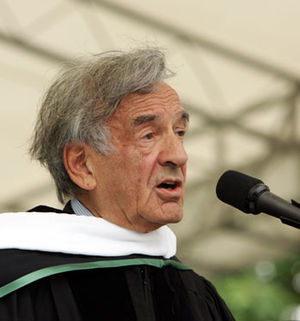Difference between revisions of "Elie Wiesel"
(adding categories) |
|||
| Line 34: | Line 34: | ||
[[Category:Nobel laureates in Peace]] | [[Category:Nobel laureates in Peace]] | ||
[[Category:Presidential Medal of Freedom award winners]] | [[Category:Presidential Medal of Freedom award winners]] | ||
| + | |||
| + | [[Category:Jewish People]] | ||
| + | [[Category:European Jews]] | ||
Revision as of 08:29, December 11, 2014
Eliezer "Elie" Wiesel was born September 30, 1928, in Romania. Wiesel is the author of 36 books dealing with Judaism, the Holocaust, and the moral responsibility of all people to fight hatred, racism and genocide. He survived being in the most dreaded of the concentration camps; Auschwitz, Buna, Buchenwald and Gleiwitz. After the liberation of the camps in April 1945, Wiesel spent a few years in a French orphanage and in 1948 was admitted and began to study at the Sorbonne.
He received the Nobel Peace Prize in 1986 for his various humanitarian works.
Death Camp Experience
Wiesel's first book, "Night", records his experience, the experience of all of the Jews sent to the camps:
Never shall I forget that night, the first night in camp, which has turned my life into one long night, seven times cursed and seven times sealed. Never shall I forget that smoke. Never shall I forget the little faces of the children, whose bodies I saw turned into wreaths of smoke beneath a silent blue sky. Never shall I forget those flames which consumed my faith forever. Never shall I forget that nocturnal silence which deprived me, for all eternity, of the desire to live. Never shall I forget those moments which murdered my God and my soul and turned my dreams to dust. Never shall I forget these things, even if I am condemned to live as long as God Himself. Never.
Quotes
"The opposite of love is not hate, but indifference."
